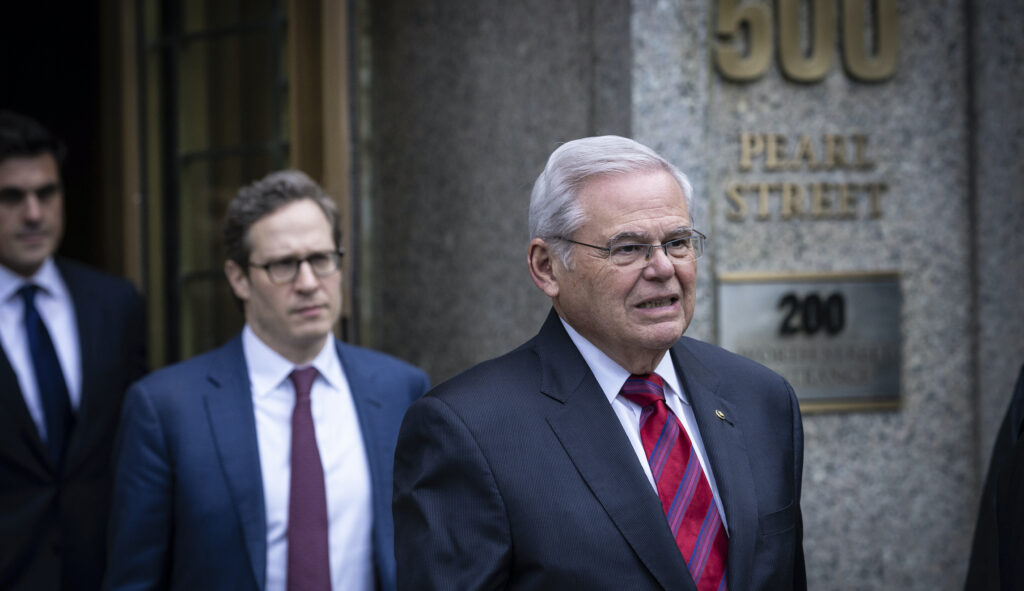
The corruption trial of Sen. Bob Menendez (D-NJ) is temporarily denying Democrats what could be the decisive vote on several judicial nominees waiting to be confirmed in the Senate.
Menendez, who stands accused of accepting bribes to provide political favors to three New Jersey businessmen and the governments of Qatar and Egypt, attended the second day of jury selection on Tuesday for a trial that is expected to last six or more weeks.
The charges have been a political headache for Senate Majority Leader Chuck Schumer (D-NY). He declined to call for the resignation of Menendez, unlike a majority of his Democratic Senate colleagues, but on repeated occasions has expressed his “deep disappointment.” Menendez has defiantly denied the allegations against him.
Those calls have died down since September, when a grand jury slapped Menendez with his first indictment, but the prosecution will affect Schumer in more subtle ways as the trial gets underway.
Menendez will be in a Manhattan courtroom instead of the Senate chamber, crimping leadership’s ability to schedule votes.
“Every vote counts,” Senate Majority Whip Dick Durbin (D-IL) told the Washington Examiner. “I can tell you that we measure attendance almost every day when we make these decisions. His absence will be felt.”
Schumer, who controls a 51-49 majority, is unlikely to put anything on the floor that is particularly divisive. Almost all of the must-pass legislation this Congress has been signed into law, while lame-duck priorities will likely include bipartisan bills that help Democrats running for reelection in November.
But Democrats will continue to move judges that President Joe Biden nominated to the federal bench, some of whom cannot attract Republican support.
Menendez’s trial comes just as Biden surpassed Trump for the number of federal judicial confirmations at this point in his term, with 194 appointments as of Tuesday compared to 193 for Trump. Biden and his allies in the Senate are seeking to remake the courts in the six months before the election, with a priority on confirming female and minority judges.
As of now, there are four circuit court nominees who cleared the Judiciary Committee without a single GOP vote, while seven party-line district court nominees are ready for floor action.
Menendez does not sit on the Judiciary Committee, but his support will be needed for their confirmation should they be brought before the full Senate.
Sen. Joe Manchin (D-WV), a centrist Democrat, has already promised not to vote for any nominees who lack Republican support, meaning Schumer cannot afford any defections and may need to rely on the tiebreaking vote of Vice President Kamala Harris.
“It doesn’t help their attendance issues,” one GOP Senate aide said of Menendez’s absence, “and there are only so many days left on the Senate calendar.”
Menendez, indicted on corruption charges for the second time in his political career, will be stuck in Manhattan at the same time former President Donald Trump’s hush money trial has him in New York. Trump gets Wednesdays and the weekends off, but must otherwise sit for the proceedings, now in their fifth week.
John Coffee, a law professor at Columbia University who specializes in white-collar litigation, said Menendez, who missed the first Senate vote of the week on Tuesday, will have much the same incentives to stay put.
“It is not just that the judge will want this, but any absence not expressly permitted by the court is likely to offend the jury,” he told the Washington Examiner. “They are there every day and want the defendant to be there also.”

Schumer has faced bigger hurdles this Congress. The prolonged absence of Sen. Dianne Feinstein, a member of the Judiciary Committee before her death last September, brought committee business to a standstill for weeks.
Around the same time, he had to navigate the hospitalization of Sen. John Fetterman (D-PA), who checked himself into Walter Reed Medical Center for depression.
For a time, Democrats moved bipartisan nominees to keep the confirmation process rolling along and were eventually able to clear some of Biden’s more controversial picks. Schumer may have to take that approach once again with Menendez gone.
Of the nearly 200 judicial nominees confirmed since Biden became president, 88% received bipartisan support. Many are entirely uncontroversial, while others attracted crossover votes from Sen. Lindsey Graham (R-SC), the ranking member of the Judiciary Committee, and other institutionally minded Republicans.
Still, a number have been panned by Judiciary Republicans as unqualified. Last week, the committee advanced the circuit court nomination of Kevin Ritz over the objections of Republicans who cited an apparent ethics complaint against him.
Ritz denied any wrongdoing and told the panel he was unaware of any complaint.
A lack of Democratic support has forced certain nominees to withdraw their nominations, among them Michael Delaney, scrutinized for his handling of a sexual assault lawsuit. Meanwhile, one current nominee, Adeel Mangi, is opposed by at least three Democrats over his association to an “anti-police” group.
Mangi lives in Menendez’s home state of New Jersey.
CLICK HERE TO READ MORE FROM THE WASHINGTON EXAMINER
Menendez, the former chairman of the Foreign Relations Committee, is on trial with two businessmen who allegedly showered gifts on him and his wife in exchange for political favors. A third pleaded guilty and is expected to testify in the case, while his wife will go on trial in July.
The senator has denounced the investigation as fueled by a political vendetta against him. In 2017, his first trial ended in a hung jury, leading the Justice Department to drop its charges.





